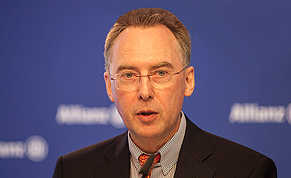When it comes to a company’s reporting, the main task is to ensure transparency about business developments. “Openness and honesty are crucial,” Wemmer told “Börsen-Zeitung”. This does not mean simply repeating all of the numbers but also explaining what the numbers mean. The CFO is no longer just chief accountant. “Besides ensuring transparency and consistency, the CFO also strives to explain the company’s strategy clearly and offer a valuable service at the same time.”
But that is not the CFO’s only task. “The CFO should act as the sparring partner for senior management, in discussions concerning the strategic direction and possible operational improvements,” he said.
One of his most important additional responsibilities is managing the capital structure. In addition to ensuring the efficient use of capital and a positive long-term development of the dividend, this also includes maintaining the Allianz Group’s solvency. His team ensures that Allianz meets all the necessary capital requirements allowing it to fulfill its insurance obligations, Wemmer explained. “However, the issue right now is that we are lacking a binding definition of required capital. Even as the debate surrounding Solvency II continues, the next discussion involving capital requirements based on systemic relevance is beginning.”
Wemmer explained that initially the issue in terms of systemic relevance was what would happen if a company fails: Would there be a domino effect? “Once it was clearly established that this would not happen in the traditional insurance business, the definition was apparently widened,” he related. The public perception was that since insurance companies are as big as banks they must be systemically relevant. This fit into the political push to place the financial industry under stricter control. However, the ramifications of this designation remain unclear, the Allianz CFO continued.
Until there is more clarity, Allianz also uses rating agency Standard & Poor’s requirements for a AA rating for orientation. Based on that, he said, Allianz is slightly above the required level of capitalization. And in “risk management, we received the highest rating that S&P awards to insurance companies,” said Wemmer. He was also confident that Allianz will achieve a good capital ratio under the final Solvency II rules as well.
Explaining the strategy
However, regulatory issues were not the only issues covered in the “Börsen-Zeitung” interview. Dieter Wemmer also take time to explain the Allianz strategy in more detail. In the last few years, Allianz has continued to do well, despite the low interest rate environment. Wemmer cites three reasons for this. Firstly, the property and casualty segment has benefited from operational improvements. Secondly, PIMCO has profited from falling interest rates. Finally, Allianz’s investment process in the life insurance business, which has always been one of the best in the industry, was further strengthened.
Nonetheless, Allianz continues to press forward. In the US, Fireman’s Fund has begun a promising turnaround. “The big challenge will be to make this positive reversal permanent,” said Wemmer. Germany also has adopted ambitious goals for 2014 “that we also want to see reflected in our numbers.”
An additional challenge, he said, is the “over-interpretation” of shareholders who are nervous about how the debate over interest rate hikes in the US will affect PIMCO. “There are many who wrongly equate PIMCO with its founder Bill Gross and the PIMCO flagship Total Return Fund,” he explained. “This bond fund represents only about 15 percent of PIMCO’s total assets. Therefore, it is wrong to infer that any net fund outflows will have a big impact on the overall company, because the other products may perform entirely differently.”
In addition, he said, “any company that has been very successful must always force itself to plan for the next successes.” Allianz continues to invest heavily in its business. For example, it is bundling several areas of activity in Allianz Worldwide Partners. It offers a range of services, from roadside assistance to international health insurance and even car insurance through automobile manufacturers. “I’m not aware of any other company that is pressing forward with such a systematic agenda,” he said.
All in all, Allianz has gotten off to a “great start” in 2013, Wemmer said of the company’s recent performance. “The first quarter was outstanding and the next three months were just as good.” Due to weather events, he noted that although they took a small hit in their flood and hail policies, ultimately, they managed to post strong results.
As for the third quarter, he merely indicated that Allianz will report on the quarter in detail on November 8.
